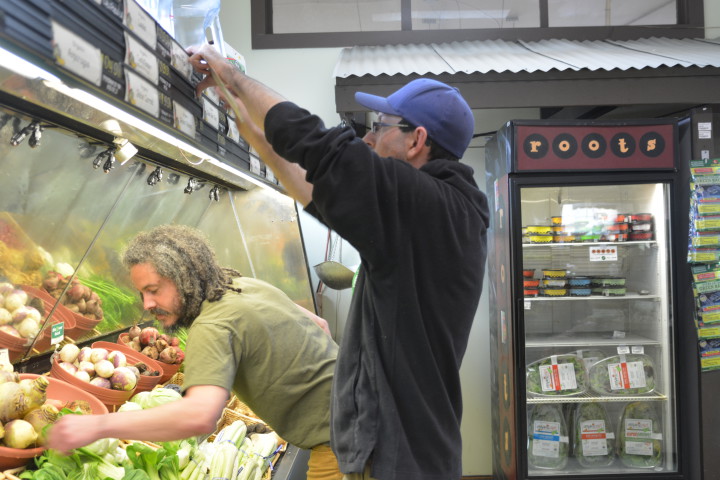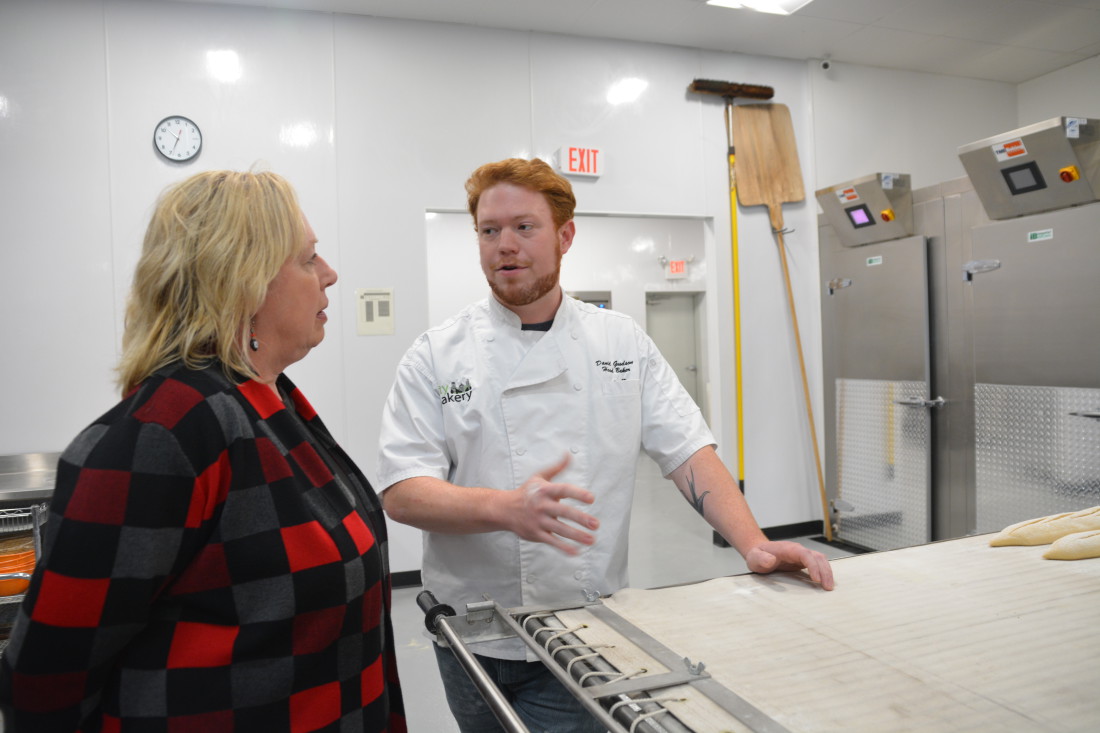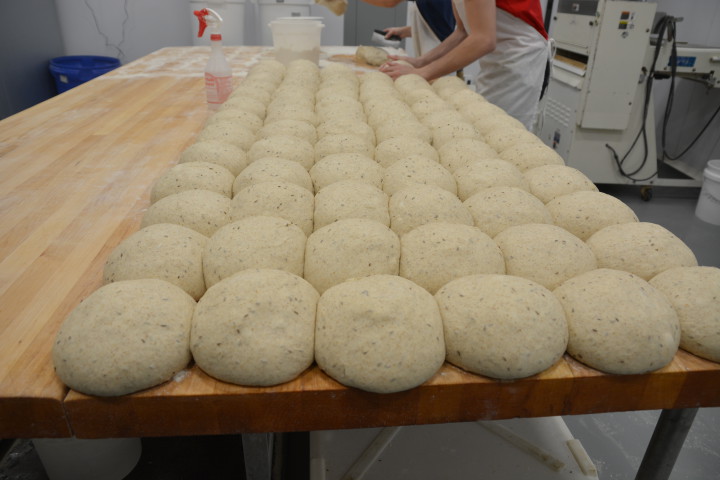Most people would agree that they want to eat food that’s healthy, but many can’t tell you what that means, specifically.
Even the U.S. Food and Drug Administration doesn’t have a solid definition. The agency is seeking comments on the labeling of food items as “healthy” through April 26. (For details and to submit comments, visit avl.mx/3fd.)
Leah McGrath, a registered dietitian who works for Ingles Markets, says the word is nebulous, at best.
“To someone who can’t eat gluten, whole-wheat bread isn’t healthy, even when it’s made from scratch with organic ingredients,” she says. “But for most of us, that would be a healthy food. The term ‘healthy food’ is much more of a spectrum than it is a binary thing.”
Like many Western North Carolina grocers, Ingles, Earth Fare and Publix all spend a lot of money marketing their food as healthy, and all try to help consumers determine what’s good for them and what isn’t. French Broad Food Co-op doesn’t have the money for marketing that the grocery store chains have, but it does promote its food as wholesome and healthy.
Do any of them sell food that’s unhealthy? That depends, McGrath says. “If you have high blood pressure, you can’t get anything that’s high in sodium and call it healthy, so, yes, all markets sell foods that are unhealthy for some people.
“One trend we’re seeing is a segment of consumers who are asking where food was raised, how it was raised and how it was treated,” McGrath says. “But by far, the larger percentage of consumers want to put the best food they can on the table and still stay within a budget, and that’s not as difficult as it might sound. You can have a healthy dinner of beans and rice with a tossed salad, or pasta with some lean meat and vegetables.”
At Earth Fare, spokeswoman Lauri Aker says the focus is on the “boot list,” which is what’s not in the food. All of the stores’ foods are free of added hormones, high-fructose corn syrup, artificial fats and trans fats, artificial sweeteners, bleached or bromated flour, antibiotics and artificial flavors, colors and preservatives.
The company, which includes 39 stores across the U.S. Southeast, mid-Atlantic and Midwest, recently launched a healthy eating campaign called “Live Longer With Earth Fare” and is in the process of removing all GMO ingredients from its hundreds of private brand products. “The No. 1 thing anyone can do to eat healthy is to eat mostly plant-based foods,” Aker says. “The next thing is to try and eat what I call clean foods — foods without a lot of artificial ingredients, dyes and colors.”
Whole Foods, which has two stores in Asheville, also steers clear of selling foods that contain certain additives. “Whole Foods Market believes in providing our customers with real food,” says spokesperson Rachael Wilson. “That means every product sold in our stores must meet strict quality standards. At a minimum, every item we sell is free of artificial flavors, colors, sweeteners, preservatives and hydrogenated fats.”
Assuring that meats are of the highest quality through responsible sourcing is also a priority for the supermarket chain. “We have industry-leading standards for responsibly sourced seafood — both farmed and wild — as well as meat and poultry that must be raised without antibiotics and hormones and assessed for animal welfare,” says Wilson. She notes that Whole Foods recently rolled out a groundbreaking sourcing policy for sustainable, traceable canned tuna that, in addition to ensuring quality, aims to reduce overfishing and support fishing communities.
At Publix, spokeswoman Kimberly Richards says the company is increasing the amount of organic foods it sells across the store, especially those under its own brand name, GreenWise. It also uses shelf tags to help consumers identify healthier food choices.
A white shelf tag means the item is conventionally raised; a teal-green tag means the item is organic or natural and a white tag with a circle on it means the item is a better choice — lower in sodium or fat, for example — than the plain, white shelf tag.
French Broad Food Co-op General Manager Bobby Sullivan says he looks for food that is fresh and processed as little as possible.
“The fewer ingredients, as a rule, the better,” he says.
Sullivan also cautions shoppers to be wary of the words “all natural.”
“That can mean absolutely anything,” he says. “While there are regulations about what can be called organic, you can call absolutely anything natural.”
Because there’s so much conflicting information on what’s “healthy,” consumers often aren’t sure what to look for, McGrath says.
“Some people are afraid to buy fresh fruits and vegetables because of pesticides,” she says. “But pesticides wash off. Or you might see blueberries labeled as ‘non-GMO,’ which is somewhat dishonest since there are no genetically modified blueberries. You’ll see water or other products that never had gluten labeled as gluten-free. Well, of course, water is gluten-free.”
But French Broad Food Co-op customer Pixie Ré, who has a severe allergy to gluten, says some gluten-free labels are there to assure consumers that there has been no cross-contamination in foods that are processed in the same plant as wheat.
“I can eat oats,” Ré says. “But I can’t if they’re produced in the same plant as wheat and there’s been cross-contamination. In that case, I’m in the emergency room.”
Part of marketing healthy food is educating consumers about what to look for, understanding that not everyone is looking for the same thing and knowing that not everyone has time to buy fresh ingredients and cook from scratch every night, Aker says.
“For someone who doesn’t have a lot of time to run from store to farmers market to store, we have meals that can feed a family of four for $10,” she says. “On Mondays, we have $5 rotisserie chicken. Add a fresh-baked baguette for $1.49 and a package of frozen veggies for $2.99, and you have a very healthy meal.” At the Publix website (www.publix.com/wellness), shoppers can download customized shopping lists for meals that suit individual families.
For consumers who say they only shop the perimeter of the store, McGrath has a message: There are plenty of healthy options to be found among the aisles in the middle of the store as well. “If you don’t go down the aisles, you miss the rice, the grains and the pastas,” she says. “You miss staples like flour — including organic and whole-grain flours. You miss the herbs and spices, and you miss the international foods.”
In fact, McGrath says, one of the most difficult things to do in marketing foods is to get people to try something new. Stores have fruits and vegetables now that most people in this region hadn’t even heard of a generation ago, and these foods are very healthy — and tasty.
“Often, when I hold up a pomegranate and ask if people can identify it, someone will guess it’s an apple,” she says. “Part of my job is to help people learn about foods they might not have tried before.”
Clare Schwartz of the French Broad Food Co-op says the store is offering more recipes to encourage people to try new things and to prepare foods themselves rather than rely on someone else to do it for them.
“We see young people looking up recipes on their phones right there in the aisle,” Schwartz says. “Cooking from scratch is making a comeback.”
All four markets sell local and regional foods, from vegetables and meats to breads. Loaves of seeded Jewish rye bread are shaped and ready to rise before going into the oven at City Bakery.
City Bakery sells its breads in Ingles Markets in addition to its own outlets. “People say they want locally sourced foods,” McGrath says. “They also tell us they want artisan foods, so we offer local breads, among other things.”
At Earth Fare, breads are made on the premises with organic flour, and they’re hand-kneaded, Aker says.
And although locally made doesn’t necessarily mean healthier, local foods can be brought to market more quickly, so they don’t need preservatives to keep them fresh.

“We have relationships with a lot of local farmers,” Sullivan says. “This food is fresh when we get it, which means it’s fresh when you get it.”
Since people are working longer hours nowadays, all three markets offer prepared foods, which are labeled with calorie and nutrition information, as per state law in North Carolina. “It’s more than just a lack of time to prepare foods,” McGrath says. “A lot of people just don’t know how to cook. They don’t have the skill set, which is what sends so many people to fast-food restaurants.”
That, she says, is what makes it even more important for grocery stores to offer healthy prepared foods and to offer information on how to cook various foods. All three chain stores offer recipes and preparation tips on their websites (www.earthfare.com, www.ingles-markets.com and www.publix.com). McGrath answers consumers’ nutrition questions via a link in the Ingles site; Publix has registered dietitians in some of its stores; and Earth Fare offers a newsletter with tips on healthy eating that consumers can sign up for on its website.
“Even though healthy food means something different to every person, it’s important to learn what it means for you,” McGrath says. “Personally, I wish all food packages were just black and white with no fancy claims on them. I would love to see nothing more than the name of the food and the calorie count and nutrition information so people would be less distracted by pretty packaging.”
Aker knows people might not have the time or the inclination to read labels, even though it’s a good idea to do so. “The healthier you eat, the longer you live,” she says. “That’s why we launched our Healthy Rewards program [the point-system program Earth Fare customers can sign up for to accrue points for money to be applied to subsequent grocery purchases]. But we know not everyone is going to read labels or do a lot of research. I say, ‘We do the digging, so you can just dig in.’”




Before you comment
The comments section is here to provide a platform for civil dialogue on the issues we face together as a local community. Xpress is committed to offering this platform for all voices, but when the tone of the discussion gets nasty or strays off topic, we believe many people choose not to participate. Xpress editors are determined to moderate comments to ensure a constructive interchange is maintained. All comments judged not to be in keeping with the spirit of civil discourse will be removed and repeat violators will be banned. See here for our terms of service. Thank you for being part of this effort to promote respectful discussion.